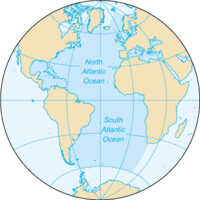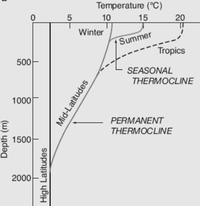
Hiatus-like decades in the absence of equatorial Pacific cooling and accelerated global ocean heat uptake
Sign Up to like & getrecommendations! Published in 2017 at "Geophysical Research Letters"
DOI: 10.1002/2017gl073578
Abstract: A surface cooling pattern in the equatorial Pacific associated with a negative phase of the Interdecadal Pacific Oscillation is the leading hypothesis to explain the smaller rate of global warming during 1998-2014, with these cooler… read more here.
Keywords: heat uptake; global ocean; equatorial pacific; pacific ... See more keywords

Mechanisms underlying recent decadal changes in subpolar North Atlantic Ocean heat content
Sign Up to like & getrecommendations! Published in 2017 at "Journal of Geophysical Research"
DOI: 10.1002/2017jc012845
Abstract: The subpolar North Atlantic (SPNA) is subject to strong decadal variability, with implications for surface climate and its predictability. In 2004–2005, SPNA decadal upper ocean and sea-surface temperature trends reversed from warming during 1994–2004 to… read more here.
Keywords: north atlantic; ocean; ocean heat; subpolar north ... See more keywords

Atlantic Ocean Heat Transport Enabled by Indo‐Pacific Heat Uptake and Mixing
Sign Up to like & getrecommendations! Published in 2019 at "Geophysical Research Letters"
DOI: 10.1029/2019gl085160
Abstract: The ocean transports vast amounts of heat around the planet, helping to regulate regional climate. One important component of this heat transport is the movement of warm water from equatorial regions toward the poles, with… read more here.
Keywords: indo pacific; heat transport; ocean heat; heat ... See more keywords

Decadal Attribution of Historic Temperature and Ocean Heat Content Change to Anthropogenic Emissions
Sign Up to like & getrecommendations! Published in 2020 at "Geophysical Research Letters"
DOI: 10.1029/2019gl085905
Abstract: We present an alternative method of calculating the historical effective radiative forcing using the observed temperature record and a kernel based on the 5th Climate Model Intercomparison Project (CMIP5) temperature response. This estimate is the… read more here.
Keywords: heat content; temperature; ocean heat; radiative forcing ... See more keywords

Recent wind-driven change in Subantarctic Mode Water and its impact on ocean heat storage
Sign Up to like & getrecommendations! Published in 2017 at "Nature Climate Change"
DOI: 10.1038/s41558-017-0022-8
Abstract: The subduction and export of Subantarctic Mode Water (SAMW) supplies the upper limb of the overturning circulation and makes an important contribution to global heat, freshwater, carbon and nutrient budgets1–5. Upper ocean heat content has… read more here.
Keywords: water; ocean heat; subantarctic mode; mode water ... See more keywords

The transient response of atmospheric and oceanic heat transports to anthropogenic warming
Sign Up to like & getrecommendations! Published in 2019 at "Nature Climate Change"
DOI: 10.1038/s41558-018-0387-3
Abstract: Model projections of the near-future response to anthropogenic warming show compensation between meridional heat transports by the atmosphere (AHT) and ocean (OHT) that are largely symmetric about the equator1–3, the causes of which remain unclear.… read more here.
Keywords: anthropogenic warming; response; ocean heat; heat transports ... See more keywords

The Subpolar North Atlantic Ocean Heat Content Variability and its Decomposition
Sign Up to like & getrecommendations! Published in 2017 at "Scientific Reports"
DOI: 10.1038/s41598-017-14158-6
Abstract: The Subpolar North Atlantic (SPNA) is one of the most important areas to global climate because its ocean heat content (OHC) is highly correlated with the Atlantic Meridional Overturning Circulation (AMOC), and its circulation strength… read more here.
Keywords: north atlantic; ocean heat; subpolar north; spna ... See more keywords

Estimating global ocean heat content from tidal magnetic satellite observations
Sign Up to like & getrecommendations! Published in 2019 at "Scientific Reports"
DOI: 10.1038/s41598-019-44397-8
Abstract: Ocean tides generate electromagnetic (EM) signals that are emitted into space and can be recorded with low-Earth-orbiting satellites. Observations of oceanic EM signals contain aggregated information about global transports of water, heat, and salinity. We… read more here.
Keywords: tidal magnetic; magnetic satellite; ocean heat; ohc estimates ... See more keywords

Quantification of ocean heat uptake from changes in atmospheric O2 and CO2 composition
Sign Up to like & getrecommendations! Published in 2019 at "Scientific Reports"
DOI: 10.1038/s41598-019-56490-z
Abstract: The ocean is the main source of thermal inertia in the climate system. Ocean heat uptake during recent decades has been quantified using ocean temperature measurements. However, these estimates all use the same imperfect ocean… read more here.
Keywords: heat uptake; ocean heat; co2; uptake changes ... See more keywords

Global reconstruction of historical ocean heat storage and transport
Sign Up to like & getrecommendations! Published in 2019 at "Proceedings of the National Academy of Sciences of the United States of America"
DOI: 10.1073/pnas.1808838115
Abstract: Significance Since the 19th century, rising greenhouse gas concentrations have caused the ocean to absorb most of the Earth’s excess heat and warm up. Before the 1990s, most ocean temperature measurements were above 700 m… read more here.
Keywords: reconstruction; ocean; ocean temperature; ocean heat ... See more keywords

Continental drift shifts tropical rainfall by altering radiation and ocean heat transport
Sign Up to like & getrecommendations! Published in 2023 at "Science Advances"
DOI: 10.1126/sciadv.adf7209
Abstract: Shifts in the position of the intertropical convergence zone (ITCZ) have great importance for weather, climate, and society. The ITCZ shifts have been extensively studied in current and future warmer climate; however, little is known… read more here.
Keywords: ocean heat; radiation; ocean; heat transport ... See more keywords